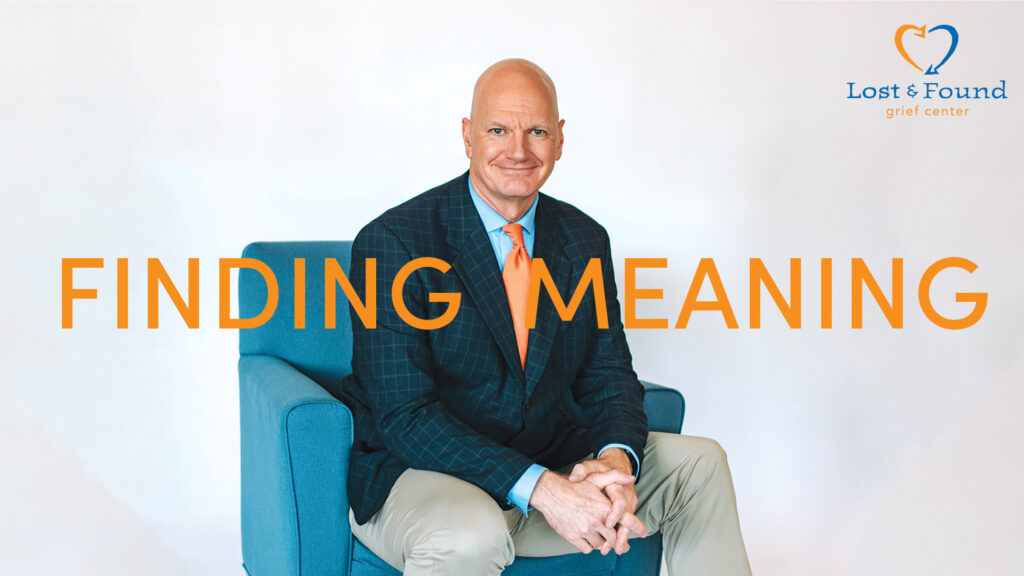Finding Meaning

Hello, and thank you for allowing me to spend a few moments with you. My name is Mark Miller. I am the new Executive Director for Lost & Found Grief Center.
I am honored to join Lost & Found and its extraordinary staff of therapists and administrators in our mission to support those in our community who are hurting.
People grieve for many reasons — perhaps most profoundly for the loss of a loved one. I feel this daily, as my family and I lost our beloved son and brother, Luke, in 2019.
Luke, an accomplished college student and distance runner, was just 20 years old when he died due to complications from epilepsy.

Walking into our first therapy session at Lost & Found, my wife and I wondered how we would survive his loss. In the weeks and months that followed, thanks to Lost & Found, we found the solace we needed and wanted. Today, I can talk about Luke with a smile and try to live a life worthy of his memory.
I came to this role at Lost & Found following a decade of work in marketing and communications at Ozarks Technical Community College. At OTC, I participated in all aspects of the college's public relations and marketing strategy. In addition to my time at OTC, I worked in higher education communications at Drury University and the University of Colorado.
Before shifting into public relations, I had a 15-year television career as a news and sports anchor in Nebraska, Kentucky, and at local Springfield television station KOLR10.
I will use my communications experience to raise Lost & Found's profile so that more people may experience grief therapy's healing power. Ultimately, we will all suffer a loss, and grief will impact our lives.
The philosopher Friedrich Nietzsche said: "To live is to suffer. To survive is to find meaning in the suffering."
Taking on the Executive Director role at Lost & Found Grief Center is finding meaning in the suffering — an opportunity for which I am deeply grateful.
Best regards,
Mark Miller
Executive Director
Children’s Grief Awareness Month: “It’s OK to Not Be OK”
Many children live with loss every day. In our culture, we often downplay or dismiss grieving children. We may not take the time to truly listen to the children around us and understand their emotions. As a result, many children grieve in silence or act out because of what they are feeling.
November is Children’s Grief Awareness Month, dedicated to addressing the unique needs of grieving children and youth. As we approach the holiday season, Children’s Grief Awareness Month arrives at a time when many bereaved children and families are facing the holidays without their loved ones.
Children’s Grief Awareness Day
On November 18, Children’s Grief Awareness Day serves as a time to come together, celebrate loved ones and recognize childhood bereavement. This year’s theme is: “It’s OK to not be OK.” Though we can’t always see it on the outside, a child’s inner turmoil after losing a loved one can be intense and isolating.
Children’s Grief Awareness Day shows kids that they aren’t alone in their experience. It’s OK for children to feel what they feel and share those feelings with others. The biggest thing the adults in their lives can do is be there and listen.
How Many Children Are Grieving?
Judi’s House and the New York Life Foundation’s Childhood Bereavement Estimation Models show that 1 in 12 children in Missouri experiences the death of a parent or sibling by age 18, which is approximately 119,000 children.
The number of bereaved youth in Missouri doubles by age 25. About 287,000 youth experience the death of a parent or sibling by the time they turn 25.
Childhood grief is much more common than many believe. Support is crucial for the development and mental health of grieving youth.
A Child’s Awareness of Death
Does your child understand death? Children’s awareness of death changes as they get older. Preschool children may not fully understand the permanence of death. They may believe death to be temporary or reversible.
Children ages five to ten begin to see death more like adults do. They grasp its permanence but still don’t believe that death could happen to someone they know and love. Around age ten, children become fully aware of death and understand that it is permanent.
No matter their age, children want to be told the truth about their loved one’s death. Parents should answer their child’s questions as honestly as possible, keeping the child’s age and circumstances surrounding the death in mind.
If you’re struggling with what to say to a child, we offer advice for talking to children about death in Talking to Children About the Death of A Family Member and Telling Children the Truth About Difficult Deaths.
What Children’s Grief Looks Like
As a parent, you may wonder if your child is reacting normally to loss. Is what they are thinking normal? Is their behavior normal? How does a child’s grief manifest?
Grief is unique to every individual. Some children may bottle all of their grief inside, while others may express it openly. It’s OK for children to feel scared, angry, hopeful or happy at any point in time. There is no “normal” way to cope after a loss, but many children share common physical and emotional experiences.
The following are typical signs of grief in children:
- - Headaches
- - Stomach aches
- - Retelling the story of how the person died
- - Inability to speak about the person
- - Trouble sleeping
- - Wanting to sleep more than usual
- - Crying
- - Guilty feelings
- - Anger
- - Confusion
- - Afraid to be alone
- - Having dreams about death
- - Worrying who will die next
- - Death play (Re-enacting the funeral, etc.)
Some children, especially young children, may not be able to verbalize how they feel. For them, coping may look like continuing on as usual for a while. Other children may work through their feelings by being more physically active. Grieving children may also be irritable and act out at home or school. If people in their life seem to be moving on, children may also be bewildered by other’s actions.
How can you support the children in your life? Bereaved children want what most grieving adults want—someone to really hear them. Children want the adults in their lives to validate their feelings, listen to them and answer their questions honestly.
Dive deeper with 10 Things Grieving Children Want You to Know.
Participate in Children’s Grief Awareness Day
On Children’s Grief Awareness Day, you can help Lost & Found Grief Center spread awareness about childhood bereavement.
Chalk Art Contest
Join Lost & Found in creating expressions of hope in our community by decorating your sidewalk, driveway or parking lot. Lost & Found’s Junior Board is hosting a Chalk Art Contest from November 1 - 14.
If you’d like to participate, please contact juniorboard@lostandfoundozarks.com to sign up. Chalk art submissions must be received by November 14. Businesses, individuals and families are encouraged to participate.
Once you submit your art, visit the Lost & Found Facebook page to vote for your favorite artwork from November 15 - 18. The photos with the most “likes” win!
Additional Ways to Show Support
- - Share your story. You can help others feel less alone by sharing your grief story with someone in-person or on social media. You can also share a memory of your loved one anonymously on Lost & Found’s virtual Memory Wall.
- - Share information about Lost & Found Grief Center. You can help others learn about our resources by talking about Lost & Found, sharing information from our website or sharing our social media posts.
- - Wear blue on November 18. Show your support by wearing blue on Children’s Grief Awareness Day. Ask your company to show up to work in blue, or dress in blue as a family.
- - Donate. If you feel inclined, you can show your support for the services Lost & Found Grief Center provides by donating to our grief support groups.
- - Volunteer. We are always looking for volunteers who are passionate about our mission. Lost & Found volunteers can help set up events, greet children and families before group, assist group coordinators or complete administrative tasks like mailings.
Do you want to learn more about our grief support groups for children?
Contact Lost & Found Grief Center today. We provide a safe space for children of all ages to express themselves and find hope for the future.
If you are in crisis, please call your doctor or 911. If you’re experiencing suicidal thoughts, please call the National Suicide Prevention Lifeline at 1-800-273-TALK (8255).
Grief at Work: How Companies Can Support Grieving Employees
As a business leader or supervisor, managing bereavement in the workplace is one of the hardest things you’ll face. Death can impact one person at your company or your entire staff.
Supporting grieving employees benefits your staff’s long-term health while building stronger company loyalty and relationships. Work is where we spend most of our time. Companies must address grief instead of asking employees to leave it at the door.
Most supervisors want to support grieving co-workers, but they don't know how to respond to grief at work. Often people don't know how to handle grief at all, especially if they've never lost anyone before.
This article discusses how companies, managers and teams can support grieving co-workers—from condolences to company policies.
Tackle Your Assumptions About Grief
What do you say to someone who is grieving? I don’t want to say the wrong thing.
How will my co-worker’s grief affect the work we need to complete?
I want to help my co-worker, but I don’t want to make them sad at work.
Most of us know how to celebrate milestones. We’re ready to sing “Happy Birthday” and wish our co-workers “congratulations” on anniversaries, promotions and births. When it comes to grief, it’s a different story. We tend to stay quiet, avert our gazes and assume our colleagues want to be left alone. We try to act like nothing has changed.
Grief is ubiquitous. We all experience grief at some point in our lives. How can we change how we react to someone’s grief at work?
Supporting a grieving co-worker starts with two things: not making assumptions about how they feel and changing our expectations.
Going back to work after the death of a parent, child or friend is not easy. Employers and team members must accept that grieving employees will be less productive and energetic. Managing grief at work takes tremendous effort, and the individual may display a range of emotions.
Remember to always lead with empathy and listen to the person who is grieving.
Assumption #1: Work is a Good Distraction
After losing a loved one, some people find focusing on work helpful. Others find returning to work difficult and struggle to be productive or “on” for customers and team members.
Don’t assume that coming back to work directly after a loss is helpful for everyone. There are many reasons why people return to work soon after losing a loved one. Short bereavement leave, financial needs or a desire to regain some sense of normalcy are all reasons you may see a co-worker back shortly after a loss.
Insight: Employers and managers can support grieving employees by presenting flexible work options and not overwhelming them with new tasks.
- Ask your employee if they prefer working from home or at the office at this time.
- Take tasks that others could complete easily off the employee’s to-do list.
- Divide some of the employee’s tasks between willing team members.
Assumption #2: You Shouldn’t Talk About Grief
People think it’s best to say nothing about the loss when it happens. In many cases, that couldn’t be further from the truth.
Sincere condolences acknowledge what the employee is going through and show that you care. Supervisors and teammates shouldn’t be afraid to check in with the person regularly.
Insight: A simple “I’m thinking of you” or “how are you feeling?” can help grieving employees feel seen.
Assumption #3: They Will Feel Better After This Year
There’s a myth that people will feel a bit better each day after a loss. The common saying “time heals all wounds” speaks to this belief. Unfortunately, time doesn’t heal all of our wounds or magically make everything better.
Grief isn’t linear. There’s no progression or endpoint. Grief is never “over” because it’s cyclical. People develop skills to cope with grief over time, but a well-intentioned comment or a milestone in someone’s life can trigger grief from a decades-old loss.
Insight: After the first year, people don’t automatically “feel better,” and employers should keep that in mind. Grief may seem like it’s in the past to people on the outside, but it may feel fresh to the person carrying the weight of it.
Assumption #4: It’s Not a Major Loss
We can't judge how people feel about the losses in their lives.
Relationships with cousins, great-grandparents, family friends or old college buddies can greatly impact someone, even if we don't share the same bonds with those people in our lives.
Insight: Some may also assume that a loss isn’t significant if the person is directly back at work. Circumstances, often financial, may require the person to keep working immediately after the loss. The individual may need to pay for the funeral or make up for losing half of their household income after the death of a spouse.
Company Benefits that Support Grieving Employees
Adding company policies and benefits focused on loss creates a supportive workplace culture. Most companies offer bereavement leave. The Society for Human Resource Management (SHRM) found that 89% of businesses surveyed provided some form of bereavement leave in 2019.
Workplaces that do not address employee grief could spend up to $75 billion annually in what Option B authors Sheryl Sandberg and Adam Grant call “grief-related losses” (as quoted in SHRM). Offering benefits, like flex time or remote work, will cost businesses less in the long run.
Bereavement Leave
Businesses offer bereavement leave for the death of a parent, child, partner or sibling.
How many days off do you get for a death in the family? Bereavement leave is typically three to five days, though grief experts recommend taking 20 days of leave for close family members.
Often, bereavement leave is only enough time off for the funeral, not enough time to process the loss. If employees need to take more time off or use vacation hours, companies should be open to letting them do so.
Supervisors should respect an employee’s time away by not calling, emailing or texting them during their absence.
Adjusted Schedules & Workload
Employees need time to process their grief and should not be expected to jump back into their role or come to the office every day.
Flexible hours, shorter work days and work-from-home options give employees the space they need. These options should be included in your company policies and discussed with the employee when they return.
Supervisors should also consider easing the employee’s workload. Taking tasks off their plate can help them feel less overwhelmed. Many tasks can be shared between team members or completed by someone else.
Employee Assistance Programs
Support and counseling are crucial to learning to cope with grief. In many cases, company-sponsored employee assistance programs (EAPs) offer free mental health services. Grieving employees can use their EAP to access free counseling at any time. EAP services are often available for the employee’s family members as well.
While EAP services can help the bereaved, they can also help colleagues learn how to provide support. Many EAPs offer training or workshops on grief and loss.
Support from Co-Workers and Managers
Co-workers and managers may not be able to change or add company benefits for the bereaved, but they can offer support in the culture they create around grief.
Here are a few ways team members can support grieving colleagues:
- Communicate with the individual regularly. Stop by their office to check in throughout the week.
- Don’t stay silent. While the individual may not want to discuss their loss in depth, managers and co-workers must acknowledge that the loss happened.
- Offer specific help. Broad offers of support can overwhelm a grieving person. “What can I do for you?” pressures the individual to come up with ways the person could help. Try offering something specific like “I’m bringing you a meal for dinner tomorrow, OK?” Meals, walking the dog or offers to watch the kids go a long way.
- Appoint one person to facilitate help. It’s great when everyone wants to help. Yet, as the grieving individual, it takes effort to field questions and offers. Appointing one person as a liaison between the employee and the rest of the team can alleviate this pressure. After speaking to the grieving person, the appointed co-worker lets others know what they can do to help.
- Open-door policy. You should never push people to talk about their loss or grief. It will take time for the employee to determine what they need at work. Are shorter hours better? Does working from home a few days a week help? Do they need to talk to someone? An open-door policy lets the employee know they can talk to you when they are ready.
When An Employee Passes Away
Everyone feels the impact when an employee passes away—staff, supervisors, vendors and customers. Communication is crucial when an employee passes away.
Leadership teams should share a cohesive message across the company. The message should be straightforward and contain as much information as the family of the deceased wishes to share. Leaders should share details about the funeral or memorial service with everyone on staff. If your company has an EAP, leaders should remind employees of the resources available for grief.
Businesses should decide whether to close for the funeral or remain open. Employees who wish to attend services should be given time to do so. Appointing someone to represent the company at the funeral is also an option if the service is during work hours and you cannot let everyone attend.
Companies can also host a memorial service to honor the individual and give employees a time and place to say goodbye.
The Coronavirus and Complicated Grief
COVID-19 has affected millions of people in the United States. As of August 15, 2021, there have been 618,591 deaths from COVID-19.
Throughout the pandemic, hospitals across the country have been overwhelmed with patients. Due to the nature of the virus, families and friends cannot visit loved ones in the hospital with COVID-19.
Researchers at Curtin University in Australia found that those grieving a loved one who died of COVID-19 experience heightened symptoms of grief.
Across the globe, COVID-19 has disrupted grieving rituals. Funerals, gatherings and religious ceremonies have changed or been put on pause. Moreover, being able to sit at someone’s bedside isn’t possible.
Today, loss seems like it’s all around us, and many have not been able to find closure. Employers need to understand how the loss of someone who died from COVID-19 may feel immensely different than the loss of someone who passed away from natural causes.
Employees may feel extreme distress, preoccupation or sadness from the sudden loss. These symptoms can lead to complicated grief and delay the person’s ability to process the loss.
For more information about grief and COVID-19, please visit our COVID-19 resources page.
Seek Support from Lost & Found Grief Center
We believe no one should grieve alone.
At Lost and Found, we support grieving individuals and families through therapeutic grief groups for all ages and individual grief counseling.
We offer age-appropriate activities for small children and young adults. Our services also include groups for adults who have lost an infant, child or spouse or are facing a terminal illness.
Contact Lost and Found Grief Center today. We provide a safe space to share feelings and interact with people who understand.
If you are in crisis, please call your doctor or 911. If you’re experiencing suicidal thoughts, please call the National Suicide Prevention Lifeline at 1-800-273-TALK (8255).



